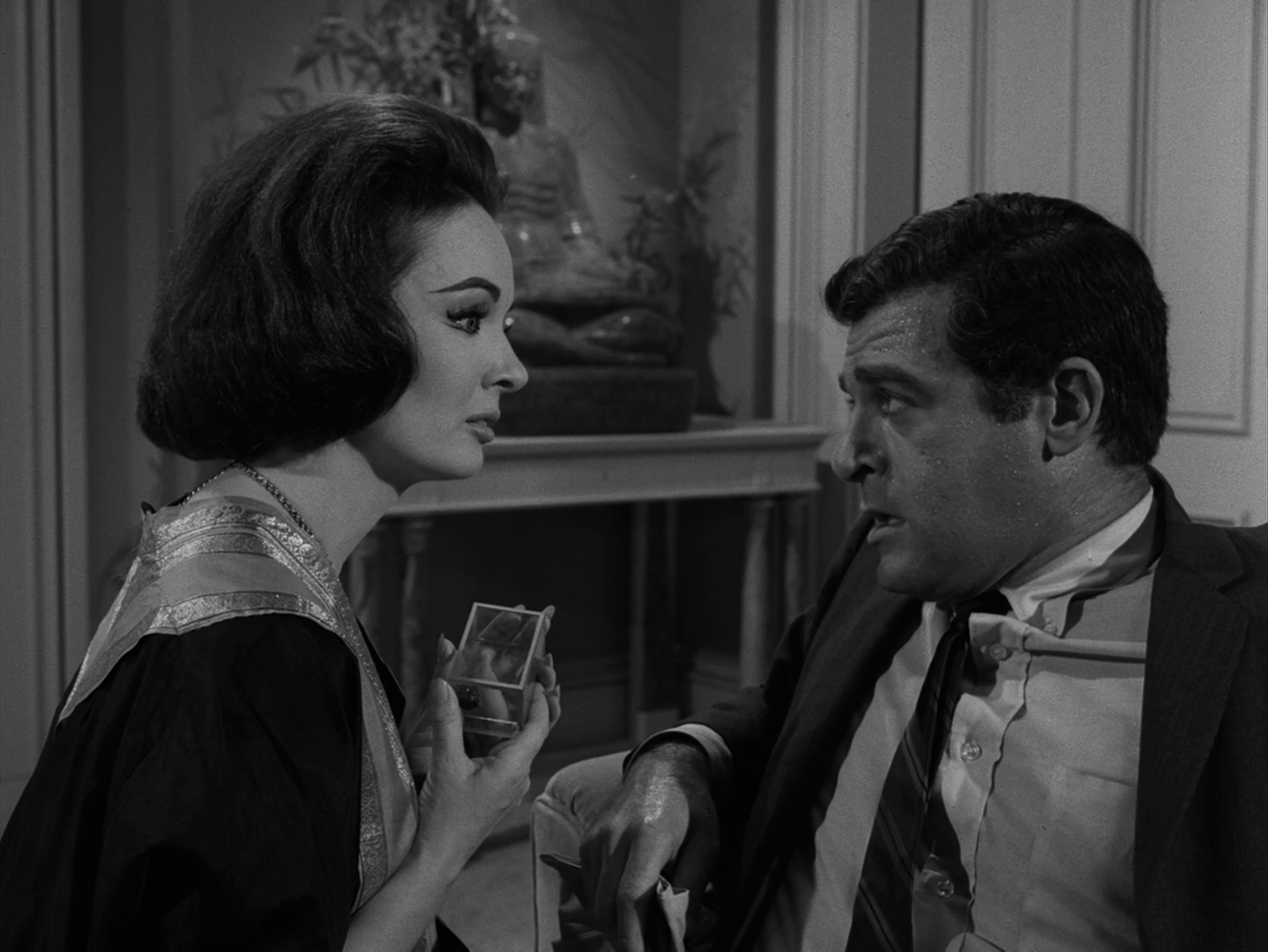Season 5, Episode 23 (143 overall)
Originally aired 3/06/1964
Cayuga Production # 2626
Fifty years ago tonight, a curious cat fell victim to the attractive wiles of an alluring femme fatale. He really should’ve seen it coming, but he was clearly in de Nile.
 Newspaper columnist Jordan Herrick arrives at the estate of actress Pamela Morris for an interview. After a bit of flirtatious banter, he gets down to brass tacks and asks her how old she is. She coyly avoids the questions, at which point her mother, Viola Draper, joins them for coffee. Ms. Draper is strangely sullen and resentful of her daughter and, on her way out, says a pointed “goodbye” to Herrick.
Newspaper columnist Jordan Herrick arrives at the estate of actress Pamela Morris for an interview. After a bit of flirtatious banter, he gets down to brass tacks and asks her how old she is. She coyly avoids the questions, at which point her mother, Viola Draper, joins them for coffee. Ms. Draper is strangely sullen and resentful of her daughter and, on her way out, says a pointed “goodbye” to Herrick.
 Pamela states that she’s 38 years old, contradicting Herrick’s research, which suggests she’s much older. She assuages his suspicions by more or less throwing herself at him, which he more than willingly laps up. They share a kiss, after which she agrees to have dinner with him that evening. On his way out, Viola accosts him and insists that he never see her again. She then imparts a shocking and impossible piece of information to him: Pamela is not her daughter…. she’s her mother.
Pamela states that she’s 38 years old, contradicting Herrick’s research, which suggests she’s much older. She assuages his suspicions by more or less throwing herself at him, which he more than willingly laps up. They share a kiss, after which she agrees to have dinner with him that evening. On his way out, Viola accosts him and insists that he never see her again. She then imparts a shocking and impossible piece of information to him: Pamela is not her daughter…. she’s her mother.
 That night, Pamela dismisses Viola’s claim, stating that her mother is “disturbed.” After he leaves her, Herrick calls his editor and has him do some research on Pamela’s early film career. It turns out there was an identical actress, Constance Taylor (whose career pre-dates Pamela’s), who disappeared under mysterious circumstances right before Pamela appeared on the Hollywood scene.
That night, Pamela dismisses Viola’s claim, stating that her mother is “disturbed.” After he leaves her, Herrick calls his editor and has him do some research on Pamela’s early film career. It turns out there was an identical actress, Constance Taylor (whose career pre-dates Pamela’s), who disappeared under mysterious circumstances right before Pamela appeared on the Hollywood scene.
Herrick brings his research materials to Viola, who confirms all of it. Viola states that she has no idea how old Pamela is, but she believes that her agelessness has something to do with the Egyptian scarab beetle, a symbol of renewal and regeneration. Pamela arrives and curtly dismisses her.
 Herrick demands the truth, unaware that Pamela has slipped something into his coffee. She agrees to tell him everything, producing a small glass box, inside which is a live scarab beetle. As he becomes increasingly impaired, she reveals that, thanks to the scarab’s power, she has endured since the time of the Pharaohs. Jordan falls to the floor, unconscious, and Pamela places the beetle onto his chest.
Herrick demands the truth, unaware that Pamela has slipped something into his coffee. She agrees to tell him everything, producing a small glass box, inside which is a live scarab beetle. As he becomes increasingly impaired, she reveals that, thanks to the scarab’s power, she has endured since the time of the Pharaohs. Jordan falls to the floor, unconscious, and Pamela places the beetle onto his chest.
Herrick rapidly ages, turning first to a skeleton, then finally to dust as the beetle saps the life force from him. Her immortality replenished, Pamela orders Viola to clean up the evidence.... just as another reporter arrives to interview her.

 “Queen of the Nile” is the final Twilight Zone episode attributed to writer Charles Beaumont; however, like his other season five credits, he didn’t actually write it. Rapidly deteriorating from either Alzheimer’s or Pick’s Disease (it wasn’t easy to diagnose or differentiate them at that time; it’s a bit of a toss-up at this late date), Beaumont utilized a number of ghost writers; in this case he and Jerry Sohl blocked out the plot, and Sohl wrote the script. In this light, it’s easy to forgive the fact that the end result is quite similar to Beaumont’s earlier “Long Live Walter Jameson” from season one, particularly in the depiction of Herrick’s rapid aging and disintegration (the same color filter trick is used to achieve the first stage of both transformations). We do get a cool skull-crumbling bit this time around (see above); ultimately, both turn into an empty suit stuffed with dust.
“Queen of the Nile” is the final Twilight Zone episode attributed to writer Charles Beaumont; however, like his other season five credits, he didn’t actually write it. Rapidly deteriorating from either Alzheimer’s or Pick’s Disease (it wasn’t easy to diagnose or differentiate them at that time; it’s a bit of a toss-up at this late date), Beaumont utilized a number of ghost writers; in this case he and Jerry Sohl blocked out the plot, and Sohl wrote the script. In this light, it’s easy to forgive the fact that the end result is quite similar to Beaumont’s earlier “Long Live Walter Jameson” from season one, particularly in the depiction of Herrick’s rapid aging and disintegration (the same color filter trick is used to achieve the first stage of both transformations). We do get a cool skull-crumbling bit this time around (see above); ultimately, both turn into an empty suit stuffed with dust.

The series has been borrowing from itself since the middle of the third season and, while “Queen of the Nile” is certainly guilty of that, it doesn’t bother me the way other guilty episodes do. For me, it serves at a decent bookend to “Long Live Walter Jameson” or, at the very least, an interesting variation on it. I’m comfortable acquitting it on the grounds that it’s entertaining, the acting is fine, there’s a nice sense of mystery that gradually changes to palpable dread, and it’s the only episode in the entire series with an Egyptian vibe.
THE MUSIC
“Queen of the Nile” features an original musical score by Lucien Moraweck; however, we also hear a few selections from Bernard Herrmann’s “The Moat Farm Murders” during the climax (a suite of CBS library cues that originated from his radio days). The suite was first released by Cerberus Records as part of their 1986 vinyl album Bernard Herrmann: Music for Radio and Television and, more recently, on CD as part of Prometheus Records’ Bernard Herrmann: The CBS Years Volume 2: American Gothic.
The Moraweck score, which is quite lovely and mysterious, has unfortunately never been released on any format, and is disappointingly not accessible as an isolated music track on the DVD and Blu-ray sets (as most TZ scores are).
DRAMATIS PERSONAE
 In the director’s chair this week is John Brahm, who holds the distinction of directing more Twilight Zones than anyone else (including classics like “Time enough at Last,” “Mirror Image” and “Shadow Play”). “Queen of the Nile” is his twelfth and final contribution to the series.
In the director’s chair this week is John Brahm, who holds the distinction of directing more Twilight Zones than anyone else (including classics like “Time enough at Last,” “Mirror Image” and “Shadow Play”). “Queen of the Nile” is his twelfth and final contribution to the series.
Lee Philips (Jordan Herrick) returns for his second TZ appearance (he headlined last season’s “Passage on the Lady Anne”). He also co-starred in “The Galaxy Being,” the pilot episode of The Outer Limits, and he enjoyed multiple roles on both of Alfred Hitchcock’s TV series (“Alibi Me,” “The Deadly” and “Deathmate” on Alfred Hitchcock Presents and, later, “The Black Curtain” on The Alfred Hitchcock Hour).
 The beautiful Ann Blyth is radiant as Pamela Morris in her sole Twilight Zone appearance, which is also the only sci-fi/fantasy/horror credit on her resume. She did show up in a couple of notable film noirs in the 40’s, however (1945’s Mildred Pierce and 1947’s Brute Force). And yes, in case you were wondering, she qualifies as a TZ Babe.
The beautiful Ann Blyth is radiant as Pamela Morris in her sole Twilight Zone appearance, which is also the only sci-fi/fantasy/horror credit on her resume. She did show up in a couple of notable film noirs in the 40’s, however (1945’s Mildred Pierce and 1947’s Brute Force). And yes, in case you were wondering, she qualifies as a TZ Babe.
Ann Blyth (right) with Joan Crawford.
 Celia Lovsky is quite good as Viola Draper, Pamela Morris’s
Celia Lovsky is quite good as Viola Draper, Pamela Morris’s mother daughter, but of course genre fans will immediately recognize her as the Vulcan High Priestess T’Pau from the classic “Amok Time” episode of Star Trek. It’s also worth noting that she'd already crossed paths with Lee Philips, in the aforementioned Alfred Hitchcock Hour episode “The Black Curtain” in 1962.
.jpg)
 After a fairly prolific film career in the 40’s and 50’s (including a few choice film noirs, among them 1942’s This Gun for Hire and 1952’s On Dangerous Ground, the latter of which, incidentally, was scored by frequent TZ music contributor Bernard Herrmann), Frank Ferguson (here playing Krueger, Herrick’s editor) enjoyed a fairly prolific TV career in the 60’s and 70’s; however, not much of it fell under the sci-fi/fantasy/horror genres. He did appear on one episode of The Alfred Hitchcock Hour (“Night of the Owl”), one Voyage to the Bottom of the Sea (“The Sky is Falling”) and one Land of the Giants (“The Marionettes”).
After a fairly prolific film career in the 40’s and 50’s (including a few choice film noirs, among them 1942’s This Gun for Hire and 1952’s On Dangerous Ground, the latter of which, incidentally, was scored by frequent TZ music contributor Bernard Herrmann), Frank Ferguson (here playing Krueger, Herrick’s editor) enjoyed a fairly prolific TV career in the 60’s and 70’s; however, not much of it fell under the sci-fi/fantasy/horror genres. He did appear on one episode of The Alfred Hitchcock Hour (“Night of the Owl”), one Voyage to the Bottom of the Sea (“The Sky is Falling”) and one Land of the Giants (“The Marionettes”).
Frank Ferguson consoles TZ alum Ida Lupino.
“Queen of the Nile” is quite good by fifth season standards (if it had aired during the first season, I’d probably dismiss it as mediocre). The actors are engaging, the music is great, and it serves as a nice bookend to Beaumont’s earlier classic “Long Live Walter Jameson” (even though Beaumont didn’t actually write this one).
That about wraps it up for this week, kids… as always, ankhs for stopping by.
Next week:
Yonkers! Yonkers! YONKERS!!!














.jpg)



.png)

.jpg)

.jpg)

.png)

















